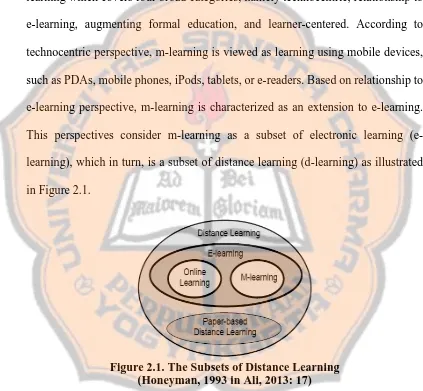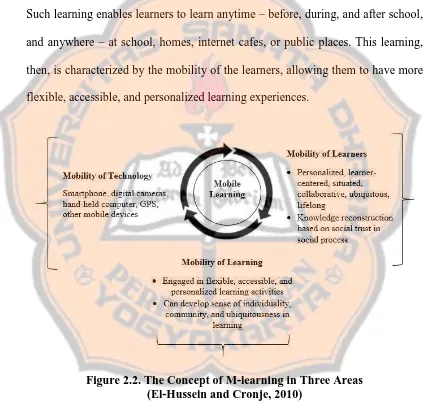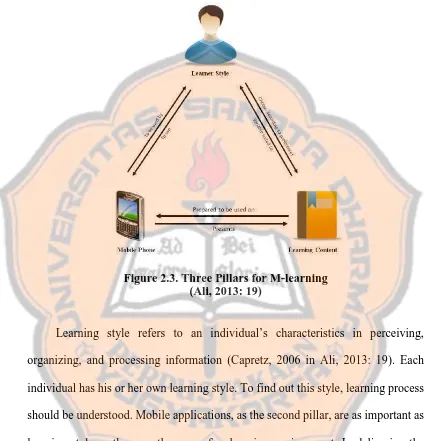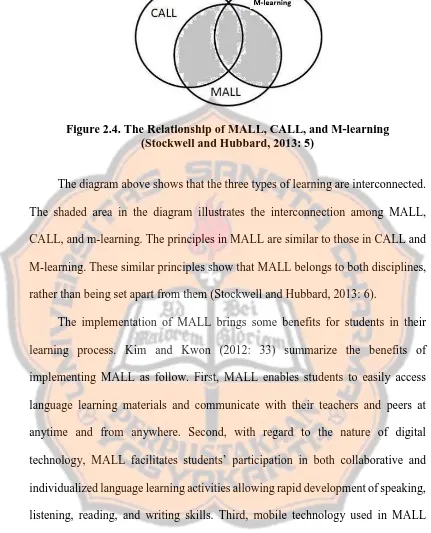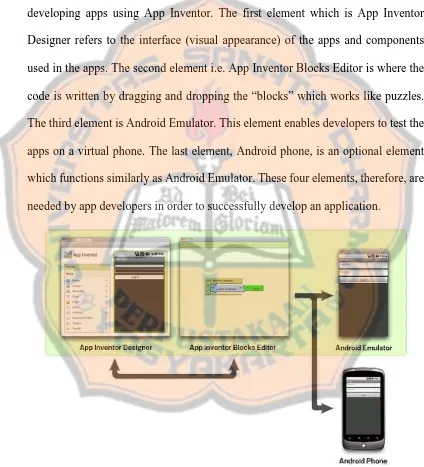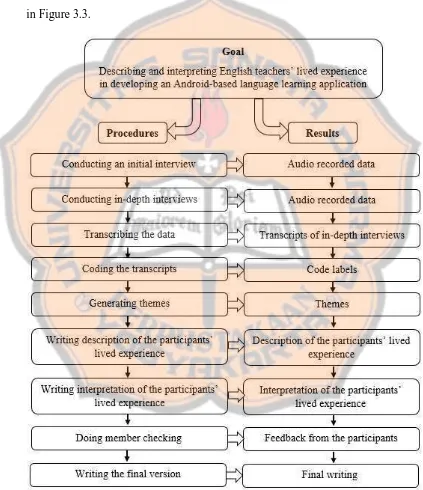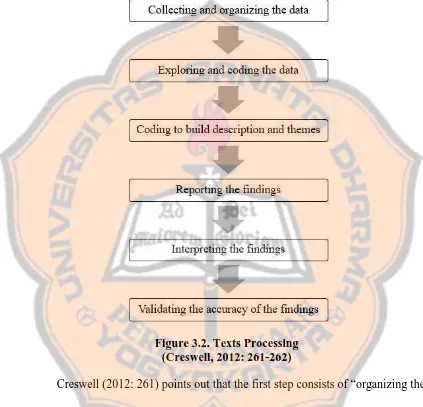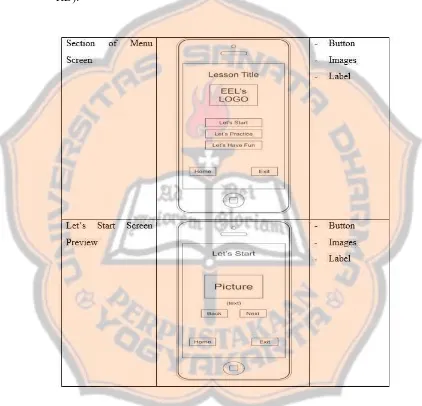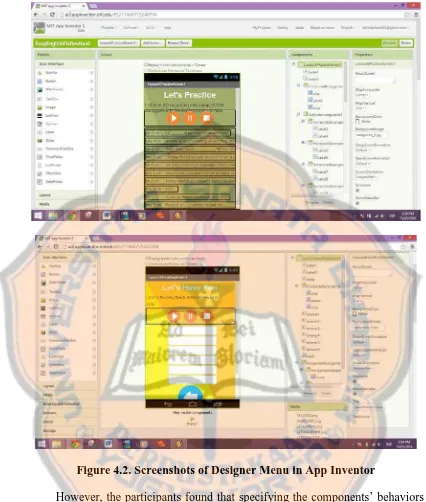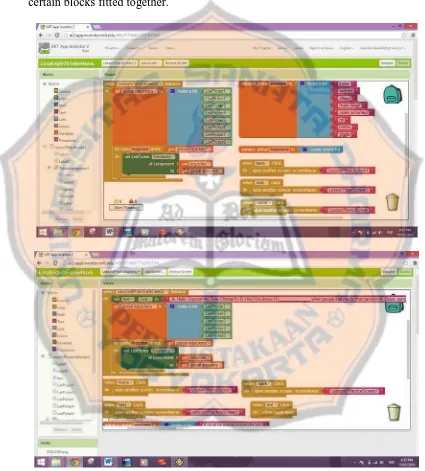ABSTRACT
Lemmuela Alvita Kurniawati. 2016. English Teachers’ Lived Experience in Developing an Android-based English Language Learning Application. Yogyakarta: The Graduate Program in English Language Studies, Sanata Dharma University.
The emergence of m-learning which provides opportunities for students to experience timeless and borderless learning environment has brought new challenges for teachers to learn, adapt, and incorporate Mobile Assisted Language Learning (MALL) into teaching learning practices. The demand for flexible, accessible, and ubiquitous learning has encouraged teachers to plan, design, and implement m-learning media to provide better learning environment. Developing an Android-based language learning application was one of the examples in providing learning resources which can be accessed both in the class and outside the school. Such phenomenon was experienced by the English teachers who received Southeast Asian Ministers of Education Organization Regional Open Learning Centre (SEAMOLEC) scholarship to study in English Language Studies, Sanata Dharma University. By developing an Android-based language learning application, it was expected that students would experience more fun, flexible, and interesting learning environment which might lead to successful learning.
As an English as Foreign Language (EFL) teacher, I should advocate the English teachers who developed an Android-based language learning application because they are more likely misunderstood by the other English teachers who have not experienced application development and commercial application developers who develop English language learning applications for profit making. Throughout the research process, the voice of English teachers in developing an Android-based language learning application was captured. Their struggles, failures, and success reflected from their experience were used to reveal the meaning of their experience.
This research attempted to reveal the essential meaning of the experience in developing an Android-based English language learning application for the English teachers by implementing hermeneutic phenomenology. The essential meaning of the event was revealed by investigating the participants’ reflection and awareness of what they had done, namely their understanding, belief, feeling, action, and intention. The process in revealing the lived experience was done through collecting texts from the English teachers who have experienced the phenomenon and developing compositions containing the essence of the experience. In-depth interviews were done to obtain the texts in order to have better understanding and interpretation of the lived experience. Two illuminating participants who could give rich descriptions of their lived experience and are willing to share it were selected for this research.
The pre-understanding of English teachers’ lived experience in developing an Android-based English language learning application was described as a series of pre-figured meaning. The pre-figured meaning which was constructed based on my initial perception consisted of digital confidence, app development literacy,
and digital expectation. The emergent meaning which were developed based on the empirical truth of the lived experience consisted of self-improvement, satisfaction, motivation, and self-actualization.
The findings of the research are expected to provide some contributions to English language teaching and learning. For the participants, this research helps them to have a habit in doing reflection of their teaching practices. The reflective awareness enables them to become more self-aware of what they do. By gaining more self-awareness, they would be able to improve their teaching practices. For English teachers and the audience, this research gives better empathic understanding of what it is like for an English teacher to develop an Android-based English language learning application. By gaining better empathic understanding, they would become more autonomous, empowered, and self-actualizing. Therefore, this research could enrich their knowledge in the attempts to develop and integrate an Android-based English language learning application in teaching and learning practices. In addition, the findings of this research give new insight for English teachers who consider developing an Android-based English language learning application. The participants’ lived experience would be beneficial for English teachers who consider developing and integrating mobile application for English language learning. From the participants’ lived experience, they would understand the potential challenges during the process and learn some lessons from the challenges encountered by the participants.
Keywords: Lived Experience, an Android-based language learning application, hermeneutic phenomenology
ABSTRAK
Lemmuela Alvita Kurniawati. 2016. English Teachers’ Lived Experience in Developing an Android-based English Language Learning Application. Yogyakarta: Kajian Bahasa Inggris, Program Pasca Sarjana, Universitas Sanata Dharma.
Munculnya m-learning yang memberikan kesempatan kepada para siswa untuk dapat mengalami pembelajaran tanpa batas waktu dan ruang membawa tantangan baru bagi para guru untuk belajar, beradaptasi, dan menggunakan MALL ke dalam praktek belajar mengajar. Tuntutan terhadap pembelajaran yang fleksibel, dapat diakses dengan mudah, dan dapat dilakukan di mana dan kapan saja telah mendorong para guru untuk merencanakan, membuat, dan menerapkan sebuah media m-learning yang dapat menyediakan lingkungan belajar yang lebih baik. Mengembangkan aplikasi pembelajaran bahasa berbasis Android merupakan salah satu contoh upaya dalam menyediakan sumber belajar yang dapat diakses dari dalam kelas dan di luar sekolah. Fenomena tersebut dialami oleh para guru Bahasa Inggris yang telah menerima beasiswa SEAMOLEC untuk belajar di Kajian Bahasa Inggris, Universitas Sanata Dharma. Dengan aplikasi pembelajaran bahasa berbasis Android tersebut, para siswa diharapkan dapat mengalami proses pembelajaran yang lebih menyenangkan, fleksibel, dan menarik yang dapat mendukung tercapainya keberhasilan dalam belajar.
Sebagai seorang guru Bahasa Inggris, saya mendukung guru Bahasa Inggris yang mengembangkan aplikasi pembelajaran bahasa berbasis Android karena mereka cenderung termarjinalisasi oleh para pengembang aplikasi pembelajaran Bahasa Inggris yang mengutamakan profit. Penelitian ini menggambarkan suara para guru yang mengembangkan aplikasi pembelajaran bahasa berbasis Android. Usaha, kegagalan, dan kesuksesan yang terefleksi dari pengalaman mereka digunakan untuk mengungkapkan pemaknaan terhadap pengalaman mereka.
Penelitian ini berusaha mengungkap makna penting dari pengalaman para guru Bahasa Inggris dalam mengembangkan aplikasi pembelajaran bahasa berbasis Android dengan menggunakan metode fenomenologi hermeneutik. Pengungkapan makna penting dari pengalaman para guru dilakukan dengan meneliti refleksi dan kesadaran mereka akan apa yang sudah mereka lakukan dalam proses pengembangan aplikasi, seperti pemahaman, keyakinan, perasaan, tindakan dan intensi mereka. Proses pengungkapan pengalaman hidup dilakukan dengan mengumpulkan teks dari guru Bahasa Inggris yang memiliki pengalaman atas fenomena tersebut dan dengan mengembangkan penjabaran yang berisi inti pengalaman tersebut. Penelitian ini menggunakan wawancara mendalam guna memperoleh teks yang pada akhirnya bertujuan untuk membangun pemahaman dan interpretasi yang lebih baik atas pengalaman-pengalaman tersebut. Partisipan penelitian ini adalah dua orang guru yang memiliki pengalaman hidup yang jelas dalam pengembangan aplikasi pembelajaran bahasa berbasis Android.
Berdasarkan pemahaman awal, pengalaman para guru Bahasa Inggris dalam mengembangkan aplikasi tersebut dapat ditunjukkan oleh rangkaian pemaknaan awal. Pemaknaan awal yang saya bangun berdasarkan persepsi saya terdiri dari
kepercayaan diri digital, pemahaman pengembangan aplikasi, dan harapan digital. Selanjutnya, makna yang muncul dari kebenaran empiris pengalaman yang mereka hidupi terdiri dari pengembangan diri, kepuasan, motivasi, dan aktualisasi diri.
Hasil temuan penelitian ini diharapkan dapat memberikan beberapa kontribusi bagi pengajaran bahasa di Indonesia, khususnya proses belajar dan mengajar Bahasa Inggris. Bagi partisipan, penelitian ini membantu membangun kebiasaan merefleksikan praktek mengajar mereka. Kesadaran untuk merefleksikan tersebut membantu mereka untuk lebih menyadari akan apa yang telah mereka lakukan. Dengan memiliki kesadaran tersebut, mereka akan dapat meningkatkan kualitas pengajaran. Bagi para guru Bahasa Inggris dan pembaca, penelitian ini dapat membangun pemahaman empatik dalam pengembangan aplikasi m-learning oleh guru bahasa Inggris. Dengan memiliki pemahaman empatik terhadap pengalaman pengembangan aplikasi m-learning, mereka diharapkan akan menjadi lebih mandiri, memiliki kewenangan, dan dapat mengaktualisasikan diri dalam kegiatan mengajar. Sehingg, penelitian ini diharapkan dapat menambah ilmu para guru dalam pengembangan dan pengintegrasian aplikasi pembelajaran bahasa berbasis Android di praktek belajar mengajar. Terlebih penelitian ini juga diharapkan dapat memberikan pandangan baru bagi para guru bahasa Inggris yang ingin mengembangkan aplikasi pembelajaran bahasa berbasis Android. Pengalaman hidup partisipan akan memberikan manfaat bagi guru-guru yang ingin mengembangkan aplikasi pembelajaran bahasa berbasis Android. Dari pengalaman hidup partisipan, guru-guru akan dapat memahami tantangan yang dihadapi selama proses pengembangan aplikasi dan dapat mengambil makna dari tantangan tersebut.
Kata kunci: Pengalaman Hidup, aplikasi pembelajaran bahasa berbasis Android, fenomenologi hermeneutik
ENGLISH TEACHERS’ LIVED EXPERIENCE IN DEVELOPING AN ANDROID-BASED ENGLISH LANGUAGE LEARNING APPLICATION
A THESIS
Presented as a Partial Fulfillment of the Requirements to Obtain the Magister Humaniora (M.Hum) Degree
in English Language Studies
by
Lemmuela Alvita Kurniawati 136332040
THE GRADUATE PROGRAM IN ENGLISH LANGUAGE STUDIES SANATA DHARMA UNIVERSITY
ENGLISH TEACHERS’ LIVED EXPERIENCE IN DEVELOPING AN ANDROID-BASED ENGLISH LANGUAGE LEARNING APPLICATION
A THESIS
Presented as a Partial Fulfillment of the Requirements to Obtain the Magister Humaniora (M.Hum) Degree
in English Language Studies
by
Lemmuela Alvita Kurniawati 136332040
THE GRADUATE PROGRAM IN ENGLISH LANGUAGE STUDIES SANATA DHARMA UNIVERSITY
YOGYAKARTA 2016
ACKNOWLEDGMENTS
First of all, I am grateful to The Almighty God who has poured out His
blessings so that I was able to accomplish this thesis.
I would like to express my sincere gratitude to my thesis advisor, Dr. J.
Bismoko, for his support and supervision throughout my research work. Without
his guidance and help, this thesis would not have been possible.
I also would like to express my deep gratitude and appreciation to all
lecturers in English Language Studies, Sanata Dharma University who have
shared their knowledge and guided me throughout my study.
My sincere thanks go to my beloved husband, Chosa for his untiring love,
patience, and support at all times. I love him to the moon and back. I would also
like to express my gratitude to my parents, my parents-in-law, my sister Vena, and
my brother in-law Hasto for their endless love and great moral support. My
special thanks go to my friends in SEAMOLEC 2013 and KBI 2014; Belinda,
Susanti, Ika, Desy, Vendi, mbak Marga, David, Sandy, Fika, Ajeng, Wawan, Lian,
Eli, Martha, Tia, Lia, pak Kosmas, Gatri, Heidy, Marita, for the friendship and
encouragement.
My thanks and appreciation also go to the participants of this study who
had willingly shared their inspiring experiences. They are all inspiring English
teachers.
TABLE OF CONTENTS
TITLE PAGE ... i
APPROVAL PAGE ... ii
DEFENSE APPROVAL PAGE ... iii
STATEMENT OF ORIGINALITY ... iv
LEMBAR PERNYATAAN PERSETUJUAN PUBLIKASI ... v
ACKNOWLEDGEMENTS ... vi
2. English Language Learning in the Twenty-First Century ... 23
3. Mobile Learning ... 24
a. The Nature of Mobile Learning ... 25
b. Mobile Assisted Language Learning (MALL) ... 33
4. Android-based Language Learning Applications ... 37
a. Android ... 37
b. Android Applications for English Language Learning ... 39
5. Developing an Android Application ... 41
C. Characteristics of Source of Texts ... 44
D. Framework of Pre-Understanding ... 46
CHAPTER III RESEARCH METHODOLOGY ... 51
A. Research Method ... 51
B. Research Design ... 52
1. Specific Goal ... 53
CHAPTER IV DESCRIPTION AND INTERPRETATION ... 64
A. Description of Participants’ Lived Experience ... 64
1. Senja’s story ... 64
2. Amara’s story ... 75
B. Interpretation of Participants’ Lived Experience ... 87
1. Pre-Figured Meaning ... 88
a. Digital Confidence ... 88
b. App Development Literacy ... 94
c. Digital Expectation ... 100
2. Emergent Meaning ... 103
a. Self-Improvement ... 103
b. Satisfaction ... 107
c. Motivation ... 108
d. Self-Actualization ... 110
LIST OF FIGURES
Figure 2.1. The subsets of distance learning ... 25
Figure 2.2. The concept of mobile learning in three areas ... 29
Figure 2.3. Three pillars for mobile learning ... 30
Figure 2.4. The relationship of MALL, CALL, and M-learning ... 34
Figure 2.5. The four elements in App Inventor ... 43
Figure 3.1. Research procedures ... 55
Figure 3.2. Texts processing ... 61
Figure 4.1. Storyboard of the application ... 92
Figure 4.2. Screenshots of Designer Menu in App Inventor ... 96
Figure 4.3. Screenshots of Blocks Editor Menu in App Inventor ... 99
LIST OF ABBREVIATIONS
AI : App Inventor AND : Android BF : Belief BN : Benefit
BYOD : Bring Your Own Device BYOT : Bring Your Own Technology CL : Challenge
DAA : Developing an Android Application EB : Educational Background
EFL : English as a Foreign Language ELS : English Language Studies ELT : English Language Teachers MALL/
MAL
: Mobile Assisted Language Learning
MO : Motivation PP : Purpose R : Researcher
RD : Research and Development
SEAMOLEC : Southeast Asian Ministers of Education Organization Regional Open Learning Centre
ST : Strategy
TB : Teaching Background
UID : Universal Instructional Design
LIST OF APPENDICES
APPENDIX 1. Informed Consent Form - Senja ... 128
APPENDIX 2. Informed Consent Form - Amara ... 129
APPENDIX 3. In-Depth Interview 1 - Senja ... 130
APPENDIX 4. In-Depth Interview 2 - Senja ... 145
APPENDIX 5. In-Depth Interview 1 - Amara ... 148
APPENDIX 6. In-Depth Interview 2 - Amara ... 161
ABSTRACT
Lemmuela Alvita Kurniawati. 2016. English Teachers’ Lived Experience in Developing an Android-based English Language Learning Application. Yogyakarta: The Graduate Program in English Language Studies, Sanata Dharma University.
The emergence of m-learning which provides opportunities for students to experience timeless and borderless learning environment has brought new challenges for teachers to learn, adapt, and incorporate Mobile Assisted Language Learning (MALL) into teaching learning practices. The demand for flexible, accessible, and ubiquitous learning has encouraged teachers to plan, design, and implement m-learning media to provide better learning environment. Developing an Android-based language learning application was one of the examples in providing learning resources which can be accessed both in the class and outside the school. Such phenomenon was experienced by the English teachers who received Southeast Asian Ministers of Education Organization Regional Open Learning Centre (SEAMOLEC) scholarship to study in English Language Studies, Sanata Dharma University. By developing an Android-based language learning application, it was expected that students would experience more fun, flexible, and interesting learning environment which might lead to successful learning.
As an English as Foreign Language (EFL) teacher, I should advocate the English teachers who developed an Android-based language learning application because they are more likely misunderstood by the other English teachers who have not experienced application development and commercial application developers who develop English language learning applications for profit making. Throughout the research process, the voice of English teachers in developing an Android-based language learning application was captured. Their struggles, failures, and success reflected from their experience were used to reveal the meaning of their experience.
This research attempted to reveal the essential meaning of the experience in developing an Android-based English language learning application for the English teachers by implementing hermeneutic phenomenology. The essential meaning of the event was revealed by investigating the participants’ reflection and awareness of what they had done, namely their understanding, belief, feeling, action, and intention. The process in revealing the lived experience was done through collecting texts from the English teachers who have experienced the phenomenon and developing compositions containing the essence of the experience. In-depth interviews were done to obtain the texts in order to have better understanding and interpretation of the lived experience. Two illuminating participants who could give rich descriptions of their lived experience and are willing to share it were selected for this research.
The pre-understanding of English teachers’ lived experience in developing an Android-based English language learning application was described as a series of pre-figured meaning. The pre-figured meaning which was constructed based on my initial perception consisted of digital confidence, app development literacy,
and digital expectation. The emergent meaning which were developed based on the empirical truth of the lived experience consisted of self-improvement, satisfaction, motivation, and self-actualization.
The findings of the research are expected to provide some contributions to English language teaching and learning. For the participants, this research helps them to have a habit in doing reflection of their teaching practices. The reflective awareness enables them to become more self-aware of what they do. By gaining more self-awareness, they would be able to improve their teaching practices. For English teachers and the audience, this research gives better empathic understanding of what it is like for an English teacher to develop an Android-based English language learning application. By gaining better empathic understanding, they would become more autonomous, empowered, and self-actualizing. Therefore, this research could enrich their knowledge in the attempts to develop and integrate an Android-based English language learning application in teaching and learning practices. In addition, the findings of this research give new insight for English teachers who consider developing an Android-based English language learning application. The participants’ lived experience would be beneficial for English teachers who consider developing and integrating mobile application for English language learning. From the participants’ lived experience, they would understand the potential challenges during the process and learn some lessons from the challenges encountered by the participants.
Keywords: Lived Experience, an Android-based language learning application, hermeneutic phenomenology
ABSTRAK
Lemmuela Alvita Kurniawati. 2016. English Teachers’ Lived Experience in Developing an Android-based English Language Learning Application. Yogyakarta: Kajian Bahasa Inggris, Program Pasca Sarjana, Universitas Sanata Dharma.
Munculnya m-learning yang memberikan kesempatan kepada para siswa untuk dapat mengalami pembelajaran tanpa batas waktu dan ruang membawa tantangan baru bagi para guru untuk belajar, beradaptasi, dan menggunakan MALL ke dalam praktek belajar mengajar. Tuntutan terhadap pembelajaran yang fleksibel, dapat diakses dengan mudah, dan dapat dilakukan di mana dan kapan saja telah mendorong para guru untuk merencanakan, membuat, dan menerapkan sebuah media m-learning yang dapat menyediakan lingkungan belajar yang lebih baik. Mengembangkan aplikasi pembelajaran bahasa berbasis Android merupakan salah satu contoh upaya dalam menyediakan sumber belajar yang dapat diakses dari dalam kelas dan di luar sekolah. Fenomena tersebut dialami oleh para guru Bahasa Inggris yang telah menerima beasiswa SEAMOLEC untuk belajar di Kajian Bahasa Inggris, Universitas Sanata Dharma. Dengan aplikasi pembelajaran bahasa berbasis Android tersebut, para siswa diharapkan dapat mengalami proses pembelajaran yang lebih menyenangkan, fleksibel, dan menarik yang dapat mendukung tercapainya keberhasilan dalam belajar.
Sebagai seorang guru Bahasa Inggris, saya mendukung guru Bahasa Inggris yang mengembangkan aplikasi pembelajaran bahasa berbasis Android karena mereka cenderung termarjinalisasi oleh para pengembang aplikasi pembelajaran Bahasa Inggris yang mengutamakan profit. Penelitian ini menggambarkan suara para guru yang mengembangkan aplikasi pembelajaran bahasa berbasis Android. Usaha, kegagalan, dan kesuksesan yang terefleksi dari pengalaman mereka digunakan untuk mengungkapkan pemaknaan terhadap pengalaman mereka.
Penelitian ini berusaha mengungkap makna penting dari pengalaman para guru Bahasa Inggris dalam mengembangkan aplikasi pembelajaran bahasa berbasis Android dengan menggunakan metode fenomenologi hermeneutik. Pengungkapan makna penting dari pengalaman para guru dilakukan dengan meneliti refleksi dan kesadaran mereka akan apa yang sudah mereka lakukan dalam proses pengembangan aplikasi, seperti pemahaman, keyakinan, perasaan, tindakan dan intensi mereka. Proses pengungkapan pengalaman hidup dilakukan dengan mengumpulkan teks dari guru Bahasa Inggris yang memiliki pengalaman atas fenomena tersebut dan dengan mengembangkan penjabaran yang berisi inti pengalaman tersebut. Penelitian ini menggunakan wawancara mendalam guna memperoleh teks yang pada akhirnya bertujuan untuk membangun pemahaman dan interpretasi yang lebih baik atas pengalaman-pengalaman tersebut. Partisipan penelitian ini adalah dua orang guru yang memiliki pengalaman hidup yang jelas dalam pengembangan aplikasi pembelajaran bahasa berbasis Android.
Berdasarkan pemahaman awal, pengalaman para guru Bahasa Inggris dalam mengembangkan aplikasi tersebut dapat ditunjukkan oleh rangkaian pemaknaan awal. Pemaknaan awal yang saya bangun berdasarkan persepsi saya terdiri dari
kepercayaan diri digital, pemahaman pengembangan aplikasi, dan harapan digital. Selanjutnya, makna yang muncul dari kebenaran empiris pengalaman yang mereka hidupi terdiri dari pengembangan diri, kepuasan, motivasi, dan aktualisasi diri.
Hasil temuan penelitian ini diharapkan dapat memberikan beberapa kontribusi bagi pengajaran bahasa di Indonesia, khususnya proses belajar dan mengajar Bahasa Inggris. Bagi partisipan, penelitian ini membantu membangun kebiasaan merefleksikan praktek mengajar mereka. Kesadaran untuk merefleksikan tersebut membantu mereka untuk lebih menyadari akan apa yang telah mereka lakukan. Dengan memiliki kesadaran tersebut, mereka akan dapat meningkatkan kualitas pengajaran. Bagi para guru Bahasa Inggris dan pembaca, penelitian ini dapat membangun pemahaman empatik dalam pengembangan aplikasi m-learning oleh guru bahasa Inggris. Dengan memiliki pemahaman empatik terhadap pengalaman pengembangan aplikasi m-learning, mereka diharapkan akan menjadi lebih mandiri, memiliki kewenangan, dan dapat mengaktualisasikan diri dalam kegiatan mengajar. Sehingg, penelitian ini diharapkan dapat menambah ilmu para guru dalam pengembangan dan pengintegrasian aplikasi pembelajaran bahasa berbasis Android di praktek belajar mengajar. Terlebih penelitian ini juga diharapkan dapat memberikan pandangan baru bagi para guru bahasa Inggris yang ingin mengembangkan aplikasi pembelajaran bahasa berbasis Android. Pengalaman hidup partisipan akan memberikan manfaat bagi guru-guru yang ingin mengembangkan aplikasi pembelajaran bahasa berbasis Android. Dari pengalaman hidup partisipan, guru-guru akan dapat memahami tantangan yang dihadapi selama proses pengembangan aplikasi dan dapat mengambil makna dari tantangan tersebut.
Kata kunci: Pengalaman Hidup, aplikasi pembelajaran bahasa berbasis Android, fenomenologi hermeneutik
CHAPTER I
INTRODUCTION
This research aimed to investigate the English teachers’ lived experience in
developing an Android application. It was intended to reveal the essential meaning
of developing an Android-based English language learning application to English
teachers. This chapter presents the justification of the research, as well as the
validity and feasibility. Therefore, this chapter covers research background,
problem identification, problem limitation, research question, research goal and
objectives, and research benefits.
A. Background
The enormous expansion of English language learning can be seen from a
number of attempts done to improve students’ learning and promote the efficacy of
learning. Teachers have made some attempts to apply various language learning
strategies, styles, methods, and approaches which show their awareness of and
demand for better learning outcome. There have been some growing demands for
innovative approaches to language learning that meet the needs of new generations
and the access of technology in language learning (Pim, 2013). As a result, teachers,
as the tip of the spear in education, are required to provide some innovative learning
environments which enable students to connect with the world around them. With
regard to this, Sharples (2006) points out that the new generations are entering the
mobile age era where mobile technology offers new opportunities to timeless and
borderless learning environments. Thus, teachers are to embrace mobile technology
in order to fulfil the demand of and extend these learning opportunities to students
of the digital age.
According to Oz (2015), technology has played a central role in foreign
language learning over the last three decades. Today’s technology, i.e. mobile
technology, provides English language learners with opportunities to get connected
with the other learners and access language learning resources easily. Moreover,
mobile technology increases learners’ English language acquisition
(Kukulska-Hulme & Shield, 2008). Using mobile technology, learners can individually learn
English either inside or outside the classroom allowing them more time to require
frequent practice. Regarding to this, Kukulska-Hulme & Shield (2008) mention that
mobile devices provide possibilities for learners to maintain a continuous
connection with the target language for self- practice and self-teach without any
space and time barriers.
In Indonesia, most students have taken mobile technology as part of their
daily life and the learning process. As reported in “Pemanfaatan Teknologi
Informasi” (2015) around 50% schools in Indonesia ranging from elementary to
senior high school are equipped with handheld mobile devices using internet
connection to support their learning, in the second quarter of 2014. With regard to
senior high school students, around 58 percent students have smartphones with
internet connection service, which means most students carry mobile devices (“58
% Pengguna smartphone dari kalangan remaja”, 2012). In other words, these latest
mobile devices are well accepted by students ranging from elementary to college as
With the emergent of mobile technology, Mobile Assisted Language
Learning, henceforth MALL, becomes one of the fine examples of the adoption of
mobile technology that has transformed learning from traditional classroom setting
to borderless and timeless learning environment. MALL enables students to access
learning materials anytime and anywhere without limitations. It enhances the
existing learning approaches both within and outside the classroom as discussed in
some studies (Wagner, 2005; Kukulska-Hulme, 2006; Bibby, 2011; Wang, Zou &
Xing, 2014). Furthermore, this learning system also empowers many teachers,
trainees, students, and other to learn with more academic rigor (Hanafi & Samsudin,
2012).
By integrating MALL, English teachers are required to understand how
students learn and communicate as well as to become capable in using recent
technology. As stated by Sarkim and Apriani (2015), students in this era are those
who were born in digital environment wherein the information they receive comes
from audio visual media. Moreover, Sastrapratedja (2013) states that the 21st
century learners are characterized by the influence of technology advancement in
education. Today’s students use a variety of technologies, especially mobile
technology, in their lives as citizens and students. They use technology to support
their learning. Consequently, by being capable in using recent technology, teachers
will be able to know the students better, provide better learning environment, and
develop innovative, creative, and interesting instructional media for the 21st century
learners.
The integration of MALL in English teaching and learning activities can be
outside the school. An Android-based English language learning application, which
is part of MALL, is one of the options for English teachers in integrating MALL
into teaching and learning activities. Teachers can use an Android-based English
language learning application to enrich and vary the instructional media in teaching
learning process. In addition, an Android-based English language learning
application provides learners with ubiquitous learning environment wherein
learners can learn and access the materials from anywhere and at anytime
(Kukulska-Hulme, 2005)
However, Sweeney and Moore (2012: 13) in their study on applications for
mobile language learning point out that there is a potential chasm between language
learning app developers who lack of knowledge of pedagogy and English teachers
who know about pedagogy but have little knowledge of mobile learning and app
development. This potential chasm can be seen from the existing Android-based
English language learning application in Google Play Store which are developed by
professional app developers for universal purposes and practices of English
language learning (Sweeney & Moore, 2012: 4). As an English teacher, I also
experience the difficulty in selecting an application which is in accordance with the
curriculum appropriateness, students’ needs and proficiency levels.
Since the existing English language learning applications are not in
accordance with the English curriculum applied in Indonesia and the students’
needs and proficiency levels, some English teachers were compelled to develop
their own application. Regarding to developing an English language learning
application, Sweeney and Moore (2012: 14) mention that English teachers and
teachers should gain knowledge of app development. Therefore, the latter option
becomes an alternative for English teachers who receive SEAMOLEC scholarship
to study in English Language Studies Sanata Dharma University, henceforth ELS.
Some studies worldwide have shown how MALL was integrated in teaching
and learning process. Chan et al. (2013) conducted a hermeneutic
phenomenological research to understand and interpret the students’ learning
experience with smartphones. There were seven themes emerged as the explication
of the essential meaning of how the participants learn with smartphones. The
findings from the study showed that learning with smartphones was personalized
and reflective of students’ needs. Arnold (2015) conducted similar study about the
experience and perceptions of faculty members who implemented Bring Your Own
Device (BYOD) in one of high schools in Georgia. The researcher implemented
phenomenology to investigate the lived experience of faculty members who
implemented BYOD. The meaning of the lived experience showed that a lack of
preparation for BYOD resulted in the difficulties in implementing it. Studies on
mobile English language learning application mostly concentrate on students’
perception towards the implementation of MALL (Kinash et al., 2012; Zou et al.,
2014; Zhang et al., 2014; Weng & Chen, 2015), teachers’ perception of MALL (Şad
et al., 2014; Oz, 2015), and design and development of MALL (Amer, 2010;
Sweeney et al., 2011).
To sum up, although there have been some studies on lived experience of
MALL integration, yet most studies discussed perceptions towards MALL and
design and development of MALL. Therefore, I placed my interest on the lived
learning application. In this study, I attempted to capture the voice of English
teachers who developed an Android-based English language learning application to
reveal the essential meaning of the lived experience. By revealing the meaning of
the lived experience, it was expected that the audience would have life-quality
improvement and better empathic understanding.
B. Problem Identification
Creating supportive and facilitating language learning environments has
become the ultimate goal of learning innovations. The availability of MALL has
provided possibilities to integrate technology in and beyond classroom contexts
(Winters, 2006; Kukulska-Hulme & Shield, 2008; Ali, 2013; Parsons, 2014; Oz,
2015). However, the efficacy of the integration is still far from complying with the
curriculum applied in formal education. Previous studies argued that the use of
MALL in classroom still needs to be improved in terms of its curriculum
appropriateness and students’ needs (Kukulska-Hulme & Shield, 2008; Ishikawa et
al., 2014; Zhang et al., 2014). Therefore, teachers, as the key persons in formal
education system, need to work harder to achieve the efficacy of the integration of
such technology into their classroom.
Furthermore, the implementation of BYOD (Bring Your Own Device) and
BYOT (Bring Your Own Technology) strategies implemented by teachers in
various classroom settings have proven to improve the students’ motivation,
enthusiasm in engaging in classroom activities, and information retention (Hanafi
& Samsudin, 2012). In addition, MALL could enhance the existing learning
(Wagner, 2005; Kukulska-Hulme, 2006; Bibby, 2011; Wang, Zou & Xing, 2014).
However, this does not reduce the challenge of curriculum appropriateness, yet it
provides insights for English teachers as well as application developers to support
the needs. Nowadays, the implementation of such strategies is only using the
available application in the market. Teachers, in this case, receive tremendous
support from mobile devices in providing effective, efficient, flexible and
accessible learning situation.
At the same time, with the advent of technology information communication
technology and the innovative use of MALL, language learners receive potential
benefits for improving the efficacy of language learning. Students’ positive
perception towards the use of mobile applications to learn English has shown that
in some ways, mobile applications have given significant influences on language
learning. App-assisted language learning is an ideal tool to foster learners’
autonomy which enables learners to achieve their learning desire in informal
settings (Chen, 2013). Further, app-assisted language learning supports students’
learning in a more interesting, dual-purpose, and effortless way (Weng and Chen,
2015).
The situation aforementioned highlights the fact that MALL has provided
both students and teachers with unique, personalized, and ubiquitous learning
environment. For teachers, MALL has offered more options to integrate mobile
technology that meets the curriculum applied, students’ needs, and students’
proficiency levels. However, in doing so, teachers might encounter some
viable, technically feasible, and pedagogically useful for the learners becomes one
of the challenges for the teachers.
Many teachers and educators are left unsatisfied with the quality of
educational applications available on the app store. As a result, many of them have
decided to make their own apps in order to meet the students’ needs. Although most
English teachers have been using smartphones and English language learning
applications downloaded from Google Play Store, only a few of them have the
knowledge of app development. This limited knowledge of app development might
become the challenge in designing the user interface of the application, creating
contents, utilizing the features in the programming tool, and specifying the
application’s behaviors.
C. Problem Limitation
Many attempts have been conducted to improve the students’ English, and
one of them is by utilizing MALL to improve English teaching and learning
activities. The integration of MALL can be exemplified by introducing and using
an Android-based English language learning application. The selection of
appropriate applications which is in accordance with the students’ needs is
necessary to support students’ language acquisition and to encourage learning. In
line with this, some English teachers have developed an Android-based English
language learning application based on the curriculum appropriateness and
students’ needs.
This study, therefore, delimited on how the English teachers perceive their
application for senior high school students in Yogyakarta, Indonesia. Hermeneutic
phenomenology proposed by van Manen (1990) was employed as the most proper
methodology in investigating the lived experience of English teachers in developing
an Android-based English language learning application. Hermeneutic
phenomenology was chosen as it is aimed to describe and interpret the meaning of
lived experience in the attempt to determine the essential meaning of it.
Additional delimitation included the limited fund and time. This study
delimited to two English teachers developing an Android-based language learning
app as one of the requirements to obtain their master degree in ELS funded by
SEAMOLEC. The participants were chosen without considering their age, gender,
family background, and employment background. They were chosen based on the
illumination aspect. In other words, the participants were those who could give rich
descriptions of their lived experience and were willing to share them. With the
limited number of participants, it was expected that rich and meaningful description
of English teachers’ lived experience in developing an Android-based English
language learning application can be elaborated.
This study was limited to the lived experience of English teachers in
developing an Android-based English language learning application.
Phenomenological studies are limited to those who participate in the study.
Although it is possible to transfer the interpretation of the lived experience to
another settings because of similar situations, generalization was not possible
(Creswell, 2007). The other limitation was the natural tendency of the participants
to forget or mislead their past memories and events in the time they were being
D. Research Question
Hermeneutic phenomenology was employed to unveil the English teachers’
lived experience. Therefore, the question formulated in this research was: What is
the meaning of developing an Android-based English language learning
application to English teachers? This question was generated to obtain the rich and
meaningful description and interpretation of English teachers’ lived experience in
developing an Android-based language application.
In developing an Android-based English language learning application,
English teachers could have their own lived experience which may vary among
them. In this study, the five fields of lived experience, namely understanding, belief,
feeling, action, and intention, were investigated in an attempt to provide answers to
the research question.
E. Research Goals
In accordance with the problem formulation presented previously, the
immediate goal of this research was to find the scientific truth of English teachers’
lived experience in developing an Android-based language application. From the
description and interpretation of the lived experience, essential meaning of
developing an Android application and the experiential structures that make up the
experience could be determined and revealed.
As the intermediate goal, from the reflection and illumination of the
phenomenon, the participants were expected to become more reflective. They were
expected to become more aware of what they had done, what they intended to do,
to have more empathic understanding which leads to better equity in life. In other
words, this research was expected to improve the audience’s empathic
understanding towards the English teachers’ feelings, emotions, perceptions, and
ideas in developing an Android-based language application without the necessity
of actually experience it.
The development of equity will consequently lead to autonomy and
empowerment. Empowerment will lead to self-actualization which is the ultimate
goal of this research. Thus, the ultimate goal of this research was to help the
researcher as well as the participants become more self-actualizing.
F. Research Benefits
This research was aimed to describe and interpret English teachers’ lived
experience in developing an Android-based language application. It was expected
that the description and interpretation could be beneficial and provide significant
contributions to the English language teaching in Indonesia.
Firstly, this research benefited the research participants to form a habit in
doing reflection of English teaching practice in general, and the integration of
mobile technology in English teaching and learning. From the beginning until the
end of the research activities, the participants involved in the process of reflecting
their lived experience in developing an Android-based language application. Their
involvement in this research helped them to do reflection and have self-awareness
of what they do and intend to do. Further, the reflective habit formation would also
help the research participants in formulating sharper goals in their life empirically
self-actualize themselves for the promotion of human dignity individually and socially
(Bismoko, 2015).
Secondly, for me, as the researcher and an English teacher, this research
helped me to build an empathic understanding of the topic being investigated. By
having more empathic understanding, it was expected that I would become more
autonomous, empowered, and self-actualized in my profession as an English
teacher, thus, I could make some improvements on my teaching. Therefore, this
research could enrich me, as an English teacher in the attempts to educate my
students using the advancement of mobile technology by integrating an
Android-based language application in teaching.
Thirdly, this research also gives some benefits to the audience. The audience
would get useful information and new insight about integrating mobile technology
in English teaching and learning process. The stories and information were
expected to help the audience have better empathic understanding in the
implementation of mobile technology in English teaching and learning in Indonesia.
Finally, the findings of this research could support the process of policy
making in English language teaching in Indonesia. The scientific truth of English
teachers’ lived experience in developing an Android-based English language
learning application could become one of the underlying considerations in
empowering teachers to develop and integrate a mobile application for English
language teaching and learning. An Android-based English language learning
application, in this respect, could become one of the tools to improve the quality of
CHAPTER II LITERATURE REVIEW
This chapter aims to discover the conceptual truth of English teachers’ lived
experience in developing an Android-based English language learning application.
It is divided into four sections; they are related research reports, theoretical review,
characteristics of source of texts, and framework of pre-understanding.
A. Related Research Reports
There have been many studies discussing the integration of m-learning into
language learning in the classroom context. The studies of app development to
support language learning process can be found in journals or dissertation writing.
However, I could not find any studies focusing on the lived experience of teachers
who develop an Android-based English language learning application for Senior
High School students in Indonesia. Mapping the other related studies helps discover
the place of this study. This section discusses some studies related to the topic of
this study.
Chan et al., (2013) conducted a hermeneutic phenomenological research to
understand and interpret the students’ learning experience with smartphones. The
aim of the study was to investigate the research question, “What does it mean to
learn with smartphones?” The findings of the study suggested that students’
experience of learning with smartphones was perceived as personalized and
multifaceted learning. The findings were represented by seven themes, namely
‘Learning is Different’, ‘This is My Learning, Not Yours’, ‘Learning and Myself’,
‘New Ways of Learning’, ‘Learning, Self, and Identity’, ‘The Paradox of Increasing
and Diminishing Value’, and ‘The Sum is more than Its Parts’.
Arnold (2015) explored the experiences and perceptions of faculty members
in a high school in Georgia about the implementation of BYOD. The aim of the
study was to have better understanding of the essential meaning of transitioning to
teaching in a BYOD environment. In his study, he tried to investigate faculty
members’ perspectives on their transitional period from traditional classroom
environment to new classroom environment in which BYOD was implemented.
The findings of the study showed that a lack of preparation for BYOD
implementation contributed to difficulties in managing the transition period from
traditional classroom environment to BYOD environment. Moreover, the in-depth
interviews revealed that the second implementation of BYOD which allowed the
participants to have more freedom in implementing BYOD brought more positive
results for the success of the program.
Fitts’ study (2015) on teacher implementation of m-learning initiative at a
sixth grade school aimed to investigate teacher’s perceptions of and experience with
the adoption and implementation process of m-learning. The researcher tried to
investigate the participants’ perspective during the adoption and implementation
process of m-learning, their feelings about utilizing mobile devices in their
teaching, and how their perceptions impacted the adoption process. The findings of
the study revealed that participants felt frustrated during the adoption and
implementation of m-learning due to connectivity issues and time constrains. They
believed 24/7 access to Wi-Fi connectivity was important. Moreover, they admitted
Many studies on mobile English language learning application mostly
concentrate on students’ perception towards the implementation of MALL (Kinash
et al., 20012; Zou et al., 2014; Zhang et al., 2014; Weng & Chen, 2015), teachers’
perception of MALL (Şad et al., 2014; Oz, 2015), and design and development of
MALL (Amer, 2010; Sweeney et al., 2011). As a result, there is a gap in the
literature for studies focusing on English teachers’ lived experience in developing
an Android-based English language learning application. In this study, I attempted
to investigate the essential meaning of English teachers’ lived experience in
developing an Android-based language learning application. By investigating the
meaning of their lived experience, their voices during the app development process
would be heard and school management and decision makers would be more
capable of providing support and assistance.
B. Theoretical Review
This section consists of concepts clarification and relations among concepts
in this research. These concepts clarification and relations among concepts, together
with related research reports and participants’ characteristics are used to improve
the trustworthiness of this research.
1. Lived Experience
Van Manen (1990: 25) mentions that phenomenology is the description of the
lived-through quality of lived experience and of the expressions of lived experience.
In other words, the purpose of phenomenology is to transform the description of
lived experience into a textual expression of its essence to reveal the meaning of
phenomenological description lies in the interpretation of the texts. Therefore, the
interpretation of lived experience becomes the essential focus in phenomenology.
The meaning of the phenomenological description as a method lies in interpretation …. The phenomenology … is a hermeneutic in the primordial signification of this word, where it designates this business of interpreting. (Heidegger, 1962: 37 in Van Manen, 1990: 25).
Van Manen (1990: 37) mentions that “lived experiences gather hermeneutic
significance as we (reflectively) gather them by giving memory to them”. The
meaning of lived experience can be assigned through meditation, conversation, day
dreams, inspirations, and other interpretive acts (Van Manen, 1990: 37).
Developing an Android-based English language learning application is lived
experience which determines a meaningful aspect of English teachers’ life. The
unity of this experience makes it into something unique, and allows them to reflect
and talk about it. It provides them a chance to reflect on what they have already
done and to find the essence of it (Van Manen, 1990: 38).
In phenomenology, the essence of meaning as mentioned by Husserl (1963)
refers to something without which a thing would not be what it is. Therefore, in
revealing the essential meaning of an event, aspects that make the phenomenon
what it is and without which the phenomenon could not be what it is should be
revealed (Van Manen, 1990: 107).
Bradley (2005) proposes another theory about lived experience. According to
Bradley (2005: 7) lived experience comprises of two senses. The first sense,
formative or diachronic sense of experience, refers to the key events in the past
which have shaped an individual into what s/he is now. This experience
around us. The second sense, immediate sense of experience, refers to key events
which are happening in here and now. Immediate sense of experience is the primary
sense since it processes the formative sense of experience (Bradley, 2005: 7).
Therefore, lived experience not only refers to sets of events in the past, but also how
we give meaning to what is going on around and within us in the present.
Lived experience refers to the mixed senses of the last events and the events
which are happening now. It is a process that mixes one’s memory which consists
of understanding, desire, intention or expectation, anticipation, relation with others,
cultural patterns, feelings, belief of sights, behaviors, smells, sounds, etc. (Murphy,
1960 in Bradley, 2005). To this point, English teachers’ lived experience in
developing an Android-based English language learning application refers to the
senses of developing the application in the past and what the essence of developing
an application means to them now. To put it in other words, English teachers’ lived
experience in developing an Android-based language learning application is
manifested in their understanding, belief, feeling, action, and intention. Further, the
aforementioned fields of lived experience are shaped or caused by intentionality,
historicity, ideology or belief, and awareness. Each individual has unique lived
experience which is different from one another. The differences are resulted from
the aforementioned structures.
The first structure is intentionality. According to Husserl’s phenomenology
(1963), one’s experience is intended or represented toward things through particular
concepts, thoughts, ideas, or images. In Husserl’s phenomenology, intentionality is
the base of consciousness. It represents one’s consciousness or awareness which
towards things in the world (McIntyre & Smith, 1989). It explains how one sees an
object based on previously experienced phenomenon.
The second structure is historicity. Individual consciousness, as the essential
structure of phenomenology, is historical (Drummond, 2000: 133). First, it can be
characterized as having historicity which means that it is formed by one’s prior
experience. Secondly, individual consciousness has its own place in objective
history. It is situated in a certain time and place and circumstance. Therefore, one’s
understanding, belief, action, feeling, and intention are influenced by his/ her
historicity.
The third structure is ideology or belief. Eagleton (1991) defines ideology as
“the process of production of meaning, signs, and values in social life”. Ideology,
as a set of beliefs, signifies one’s thought on an object or phenomenon. With regard
to the purpose of phenomenology i.e. to assign essential meaning of lived
experience, ideology forms how one sees the life world.
The last structure is awareness. In Husserl’s phenomenology, awareness is
structure that makes experience conscious (Smith, 2013). To put it in other words,
a certain awareness of the experience one has while living through or performing it
is what makes experience conscious. Moreover, Smith (2013) points out that
awareness is also a defining characteristic of conscious experience which gives the
experience a first-person perspective of the object of the study. Therefore,
awareness allows an individual to have a first-person perspective on certain
experience.
In sum, intentionality, historicity, ideology of belief, and awareness are the
Android-based English language application. The meaning of their lived experience is
manifested in their understanding, belief, feeling, action, and intention. Further,
those aforementioned fields will be discussed as follow.
a. Understanding
According to Fish (2014), understanding is a psychological process related to
an abstract or physical objects, such as a person, situation, or message by which one
is able to think about it and use concepts to deal with it. Understanding helps one
to relate concepts they have in mind with the objects being observed and judge
possible responses related to it. Meanwhile, Munhall (2008: 903) defines
understanding as “comprehending an entity; achieving a grasp of the essence of
another or of an experience; empathizing or sympathizing with another individual,
group, or culture; or knowing what something is about or something is like”.
Understanding helps us to know the consequences of things and of actions done
previously.
Siegel and Smith (1998) in Galle (2004: 593-594) propose four elements of
understanding which support the definition and concept of understanding. The first
is that to understand something is to know a theory. The second element is that to
understand is to make sense of something or to make something plausible. In other
words, to understand something means making sense of something by proving it
through scientific method. The third element is that to understand something means
to be able to apply it appropriately. Forth, understanding involves the acts of
examining the reasons that justify a claim. Based on the elements proposed by
Android-based English language learning application refers to the process of
knowing the theory in developing an application, proving it through scientific
method, and being able to apply the theory appropriately and to examine the reasons
that justify it.
b. Belief
Belief is defined as an “individual’s judgment of the truth or falsity of a
proposition, a judgment that can only be inferred from a collective understanding
of what human beings say, intend, and do” (Pajares, 1992 in Bingimlas & Hanrahan,
2010: 416). Meanwhile, Borg (2001: 186) states that belief is a conscious or
unconscious intention which is evaluative since it is accepted as something true and
considered as a guide to one’s thought and behavior. Belief plays an important role
in life, as well as in many fields of teaching. It helps individuals to decide what
approach is considered appropriate in the teaching learning process, as well as to
make sense of the world.
With regard to teachers’ belief, Borg (2001: 187) defines teachers’ belief as
their pedagogic belief, or belief which is related to an individual teaching. The
belief covers some areas, namely belief about teaching, learning, learners, subject
matter, and the role of a teacher. Teachers’ belief of some areas in teaching and
learning plays an important role in making decisions about classroom instructions.
It influences the goals of the learning, procedures, classroom interaction, and
material selection of teaching. In relation to developing an Android-based English
language learning application, English teachers’ belief refers to their judgments and
language learning, learners, subject matter, and purpose of developing an
Android-based English language learning application.
c. Feeling
Peirce (2004) defines feeling as a state which is entirely in every moment of
time as long as it endures. Meanwhile, Shouse (2005) states that feeling is a
sensation that has been checked against previous experiences and labelled. Each
individual has a different set of sensations which is used to label their feeling. In
delving into one’s feeling, a question such as “How do you feel about that?” can
used. This question, therefore, elicits adjectives responses expressing feeling, such
as anxious, happy, afraid, intimidated, confident, and so on (Patton, 2002: 350).
Drawing on the previously elaborated definitions of feeling, English teachers’
feeling in this study refers to what they feel about developing an Android-based
English language learning application. Furthermore, I also made an attempt to
explore the English teachers’ feeling when they learned to use the programming
tool to develop an application. By exploring their feeling, a meaningful and rich
description and interpretation of lived experience will be obtained.
d. Action
Davidson (1980) in Wilson and Shpall (2012) asserts that an action is
something an individual does intentionally. Action and intention are closely related.
When an individual does an action, s/he does it with her/his intention. The action
of developing an Android-based English language learning application involves an
Meanwhile Vallacher and Wegner (2012: 329) state that action is concerned
with what people do, whether privately or in explicit social contexts such as
relationships, groups, and crowded streets. When it is done privately, it can be
something as “writing”, “reading”, or “developing an app”. On the other hand, when
done in explicit social contexts, it can be “making a phone call”, “attending a class”,
or “discussing problems related to app development”.
In relation to developing an Android-based English language learning
application, English teachers’ action refers to the actions or activities they have
done in order to produce an application which accommodates the English
curriculum being used, students’ needs, and proficiency level. The actions include
those done both before and during the process of developing an Android-based
English language learning application.
e. Intention
As Rummel (1991) suggests, intention is a desire to achieve some future goals
through some specific behavior in a particular circumstance. For instance, a student
enrolled in a university is perceived as if intending to get a degree, or someone
developing a mobile application is perceived as if intending to integrate technology
to the classroom context. In relation to this definition of intention, Setiya (2014)
proposes three areas of intention. The first is intention for the future, as when I
intend to finish my study this semester. The second is intention with which someone
acts, as I am typing with the further intention of writing a thesis. The last one is
intentional action, as in the fact that I am typing this thesis intentionally. In
Drawing on the definition and areas of intention, English teachers’ intention
in this study is identified from what they desire or expect to do by developing an
Android-based English language learning application. In developing an application,
English teachers are expected to have intention for the future, intention with which
they act, and intentional action.
2. English Language Learning in the Twenty-First Century
Bajcsy (2002) argues that the use of technology in the classroom plays a
central role and it becomes a normal part of English language teaching and learning
practice over the last three decades. As technology has been integrated in teaching
instructions, teachers and learners have more opportunities to get well connected
and educated. Dudeney and Hockly (2007: 7) provide some reasons why
technology is important in teaching and learning practices. Internet access is
becoming increasingly available to learners, they can easily access it in their homes,
public places, school, or internet cafes. Secondly, English, as an international
language, has been used in many technological contexts. Finally, technology,
especially the Internet, provides learners with opportunities for accessing authentic
tasks, materials, and ready-made ELT materials easily. Drawing on these reasons,
educators need to implement the integration of technology in pedagogical context
and develop the opportunities that enhance learning through technology.
Language learning has shifted from traditional learning focusing on
teacher-centered approaches to student-teacher-centered approaches (Jacobs & Farrell, 2001). This
paradigm shift on language learning has brought some changes in foreign language
cooperative learning, and teachers as co-learners (Jacobs & Farrell, 2001).
Therefore, technology becomes the trend towards learner-centered approach which
not only fosters individuals’ participation in learning, but also learning autonomy.
English learning in the twenty-first century is characterized by the integration
of technology in learning process (Eaton, 2010). By using technology, students are
able to demonstrate their learning and learning outcomes through student-made
videos, student blogs, Wikis and podcasts, and mobile applications for language
learning. Further, in the twenty-first century English learning, technology functions
as an enabler which helps organize and provide content materials for the students
which are accessible at all time (Bajcsy, 2002). This technology feature enables
students to easily learn at anytime and from anywhere without any time and space
barriers.
3. Mobile Learning
As technology has been developed rapidly, the demand for learning anytime
and anywhere has led to the new type of electronic learning called mobile learning,
henceforth m-learning. Mobile devices such as netbooks, laptops, tablets,
smartphones, e-readers, and iPads have become widespread, especially among
young people. Moreover, with the increase in BYOD (Bring Your Own Device)
approaches to classroom learning which is implemented in some schools,
m-learning has grown rapidly in popularity (Parsons, 2014: 1). Based on the idea of
learning anytime and anywhere, m-learning suggests teachers to the idea of
bridging digital divide between teachers and learners. In other words, the
the development of technology used by their students who are considered as digital
natives (Dudeney and Hockly, 2007: 8).
a. The Nature of Mobile Learning
In defining learning, Winters (2006: 5) suggests his perspectives on
m-learning which covers four broad categories, namely technocentric, relationship to
e-learning, augmenting formal education, and learner-centered. According to
technocentric perspective, m-learning is viewed as learning using mobile devices,
such as PDAs, mobile phones, iPods, tablets, or e-readers. Based on relationship to
e-learning perspective, m-learning is characterized as an extension to e-learning.
This perspectives consider m-learning as a subset of electronic learning
(e-learning), which in turn, is a subset of distance learning (d-learning) as illustrated
in Figure 2.1.
Figure 2.1. The Subsets of Distance Learning (Honeyman, 1993 in Ali, 2013: 17)
Honeyman (1993) in Ali (2013: 15) defines d-learning as “a process to create and
provide access to learning when the source of information and the learners are
separated by time and distance, or both”. In the past, d-learning has some
restrictions since it is delivered via satellite (Ali, 2013: 16). However, recently,
d-learning relies on the advancement of technology which makes the process of
delivering the learning materials and information much easier than before.
Meanwhile, Brown (2005: 303) defines e-learning a subset of d-learning, as the
process of delivering content and information via electronic media, such as internet,
intranet, audio/video tape, or CD-ROM.
The term e-learning covers a wide set of applications and processes including computer-based learning, Web-based learning, virtual-classrooms and digital collaboration. We define e-learning as the delivery of content (and interaction) via all electronic media, including the Internet, intranets, extranets, satellite broadcast, audio/video tape, interactive TV, and CD-ROM. Yet, e-learning is defined more narrowly than distance learning, which would include text-based learning and courses conducted via written correspondence (Brown, 2005: 303).
Conceptually, as illustrated in Figure 2.1., e-learning comprises of online learning
(wired) and m-learning (wireless). Dudeney and Hockly (2007: 136) mention that
online learning, as the subset of e-learning, is learning which takes place via the
Internet, while m-learning is m-learning which includes the use of mobile phones,
MP3 players, PDAs, iPods, or tablets.
In accordance with Winters’ (2006) third perspective i.e. augmenting formal
education, m-learning offers opportunities for learning which extend beyond formal
education and traditional learning. As pointed out by Winters (2006: 5), formal
education is characterized as face-to-face teaching, while traditional learning is
learning which takes place in the classroom. Therefore, by this point, m-learning
provides learners with greater opportunities to learn not only in their classroom
